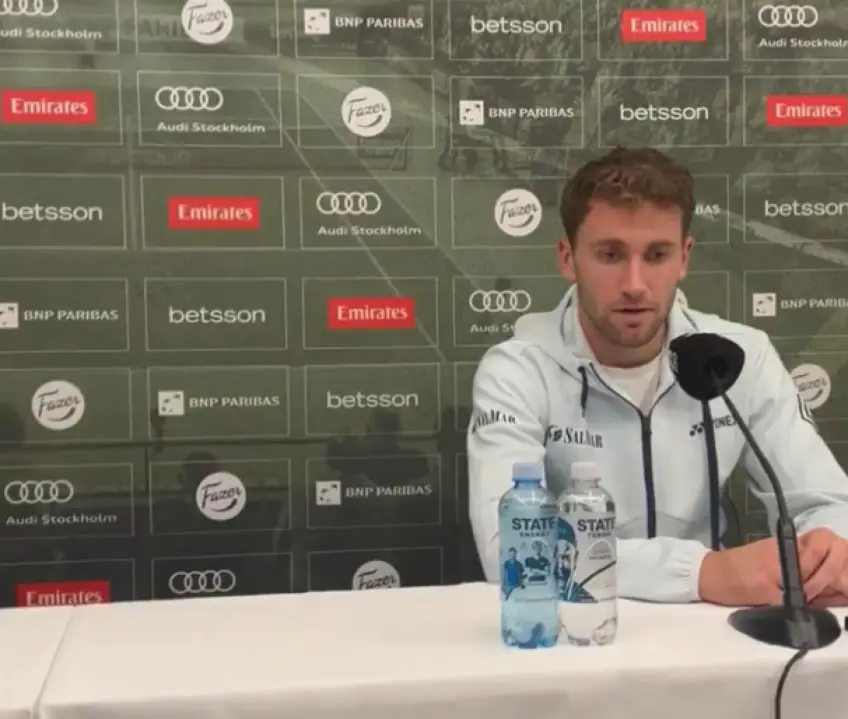
Casper Ruud, the world No. 8 and a prominent figure in professional tennis, recently found himself at the center of a media storm following his comments about Saudi Arabia and its relationship with sports. During a press conference at the Stockholm Open, Ruud was asked about the inaugural Six Kings Slam taking place in Riyadh, where some of tennis’s biggest stars, including Novak Djokovic, Rafael Nadal, and Carlos Alcaraz, participated in an event that offered unprecedented prize money. Ruud’s remarks regarding the event, coupled with his critique of the Norwegian government’s tax policies, sparked a mixture of support and backlash from fans and fellow athletes alike.
### The Six Kings Slam and Its Context
The Six Kings Slam, hosted in Riyadh, featured a star-studded lineup of players and offered a staggering $6 million in prize money—the highest ever in tennis history. Each participant was guaranteed a minimum payout of $1.5 million, leading to discussions about the implications of such financial incentives. Many critics accused the players of “money grabbing,” suggesting that Saudi Arabia was engaging in “sportswashing” to improve its global image amidst ongoing human rights concerns.
As Ruud navigated this complex landscape, he noted that while Saudi Arabia has a controversial history, change must start from somewhere. He emphasized that the country appears eager to modernize and shift its global image, suggesting that participating in sports could catalyze this transformation. Ruud’s position underscores a broader debate within the sports community regarding the ethical implications of competing in countries with questionable human rights records.
### Ruud’s Perspective on Change
In his commentary, Ruud recalled how the Women’s Tennis Association (WTA) suspended its operations in China after the troubling disappearance of player Peng Shuai following her allegations against a high-ranking politician. Despite this, WTA events resumed in China as the COVID-19 pandemic waned, leading Ruud to question the consistency of the tennis community’s stance on ethical issues in sports.
“I didn’t get an offer from the Six Kings Slam, but I have had offers in the past, and I have chosen not to go,” Ruud said. “It is obviously a controversial country in terms of many things, but there are other countries that are controversial as well that we go to and play in. Look at China with Peng Shuai. So it will be inevitable to play in Saudi in the future; I heard they will host a new tournament (Masters 1000) in the future.”
Ruud’s perspective illustrates the delicate balancing act athletes must perform as they navigate their professional careers while confronting moral and ethical dilemmas. His stance suggests a nuanced understanding that while past actions by the Saudi government may be questionable, involvement in the sporting world could prompt positive changes within the country.
### Navigating the Political Landscape
Ruud’s critiques of both Saudi Arabia and the Norwegian government were met with varied responses. Following his comments, some Norwegian politicians expressed their disagreement, while others praised him for speaking out. However, after his quarterfinal exit from the Stockholm Open at the hands of Tallon Griekspoor, Ruud took a step back from political discussions.
“A lot of people have a lot of opinions on anything you say because people have different views,” he said. “So I won’t speak much about politics for a while.” This statement reflects a common sentiment among athletes who often find themselves embroiled in political controversies, leading them to reconsider their public comments.
### The Broader Implications of Ruud’s Comments
Ruud’s commentary about Saudi Arabia and the ongoing discussions surrounding sportswashing raise important questions about the future of professional sports. As countries with controversial histories look to leverage sporting events to improve their global image, athletes and organizations will need to consider their roles in this process carefully.
As Ruud mentioned, the leadership in Saudi Arabia appears keen on fostering a more westernized image, especially in the realm of sports. “Obviously they have a lot of money, and I know what I am going to say will probably be described as sportswashing, but it seems to me that their new leader Mohammed bin Salman wants to do something and especially a lot of things in sport,” he remarked. “He wants to, maybe, change the country and maybe make it a bit more westernized.”
In light of these complexities, Ruud’s insights underscore the need for ongoing dialogue regarding ethics in sports. Athletes, fans, and organizations alike will need to navigate these challenging waters thoughtfully as they consider the implications of their actions on a global scale.
### Conclusion
As Casper Ruud moves forward in his career, his willingness to engage in discussions about politics, ethics, and sports will likely continue to shape the discourse within the tennis community. While he may refrain from discussing these topics for the time being, the conversations he has initiated will remain relevant as tennis, and sports in general, evolve in an increasingly interconnected world. Ruud’s perspective serves as a reminder that athletes are not just competitors; they are influential figures who can challenge norms and encourage change on a global scale.
Leave a Reply